On January 3, 106 BCE, in Arpinum, a town in the Roman Republic, Marcus Tullius Cicero was born. A statesman, orator, philosopher, and writer, Cicero became one of Rome’s most influential figures. Known for his eloquence and political acumen, he shaped Roman politics and philosophy, leaving a legacy that has endured for over two millennia.
A Scholar from Humble Beginnings
Born into a wealthy but non-political family, Cicero was not part of Rome’s traditional aristocracy. However, his intellectual abilities and ambition propelled him into the upper echelons of Roman society. He was educated in law, rhetoric, and philosophy in Rome and later studied in Greece, where he immersed himself in the teachings of Plato and Aristotle.
The Great Orator and Advocate
Cicero first gained fame as a lawyer, defending clients with unmatched eloquence and logic. His ability to sway juries and audiences earned him the title novus homo (new man), as he rose to prominence without the advantage of noble lineage.
One of his most famous cases was his prosecution of Gaius Verres, a corrupt Roman governor, in 70 BCE. Cicero’s speeches, collectively known as In Verrem, showcased his rhetorical brilliance and solidified his reputation as Rome’s greatest orator.
A Political Career Fraught with Danger
Cicero served as consul in 63 BCE, during which he exposed and thwarted the Catiline Conspiracy—a plot to overthrow the Roman Republic. His speeches against Catiline, known as the Catilinarian Orations, remain iconic examples of political rhetoric.
Despite his successes, Cicero’s political career was marked by turbulence. He was exiled in 58 BCE after clashing with powerful rivals, including Julius Caesar and the populist politician Clodius Pulcher. Although he returned to Rome a year later, his influence in politics waned during Caesar’s rise to power.
Philosophy and Writing
In his later years, Cicero turned to philosophy, translating Greek works into Latin and writing extensively on ethics, politics, and the nature of the universe. His works include:
• De Republica (On the Republic): A dialogue on justice and the ideal state.
• De Legibus (On the Laws): A treatise on law and governance.
• De Officiis (On Duties): A moral guide on ethical behavior and leadership.
Through his writings, Cicero introduced Greek philosophy to Roman audiences and shaped the intellectual traditions of the Western world.
The Fall of Cicero
Cicero’s staunch defense of the Republic made him a target during the power struggles following Caesar’s assassination. In 43 BCE, after denouncing Mark Antony in a series of speeches known as the Philippics, Cicero was declared an enemy of the state by the Second Triumvirate.
He was captured and executed on December 7, 43 BCE. According to accounts, his severed hands and head were displayed in the Roman Forum as a grim warning to others who opposed the ruling regime.
Legacy and Influence
Cicero’s influence extends far beyond his lifetime. His writings on philosophy, politics, and rhetoric have shaped Western thought and education, inspiring figures like St. Augustine, Thomas Jefferson, and John Locke. His works remain essential reading for students of history, politics, and law.
Cicero: The Voice of the Republic
Marcus Tullius Cicero’s life embodies the ideals of intellect, courage, and civic duty. Through his eloquence and dedication to justice, he became a symbol of the values of the Roman Republic.
His words and ideas continue to resonate, reminding us of the enduring power of reason and the principles of good governance.




